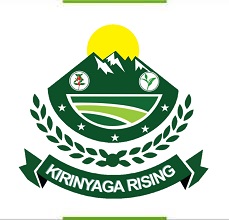Waiguru calls for consideration of farmers cooperatives as distribution points for subsidized fertilizer
Kirinyaga County Governor Anne Waiguru has asked for reconsideration of the current distribution system for the subsidized fertilizers. She has proposed for distribution through the local farmers’ cooperative societies which are closer to the beneficiaries. Currently distribution of the subsidized fertilizer is done through the Kenya National Trading Corporation (KNTC) with farmers in Kirinyaga picking it at the National Cereals and Produce Board (NCPB) depots at Sagana and Mwea. In an address read on her behalf by the County Executive Committee Member for Cooperatives, Calbert Njeru, Waiguru said that the current pick up points pose challenges of access and transportation since they are far from the farmers. “We, therefore, request that the program also considers the farmers’ cooperative societies as depots where farmers can access their fertilizer, and pay through the cooperatives”. Said the governor.
The request was made at Kamwangi Coffee Factory in Gichugu constituency where Cabinet Secretary for Cooperatives and Small, Micro and Medium Enterprise Development, Simon Chelugui launched Ngariama Farmers’ Cooperative Society coffee payout of Ksh. 100.5. The society is the first to release last season’s coffee crop payout to members, a move hailed by the governor as a demonstration of confidence, effective and efficient leadership by the management. “Our farmers are looking forward to the full implementation of various policies that are aimed at enabling them to reap from the commercialization of their agricultural activities, given that ours is an agrarian economy”, the governor told the CS. The CS said that the government is revitalizing agricultural cooperative in the dairy, coffee, cotton, tea and maize among others and a multi-agency team has been established to assist in distribution of subsidized fertilizer to the farmers. He added that coffee production has been declining due to various issues including lack of affordable inputs and fluctuating world prices and non-responsive legislation among others. He however said that with concerted efforts in implementing various interventions, coffee payout will be getting better.
Waiguru said that there have been various strides made toward restoring the coffee sector to the goldmine that it was years back reiterating that the county government was committed to supporting farmers to increase the productivity and profitability of their activities through education on best agricultural practices as well as the provision of farm inputs and equipment. Kirinyaga is the second leading county in coffee production in Kenya, coming after Kiambu. In terms of quality, the county has been producing some of the best-rated world specialty coffees whose distinct taste, aroma, and flavor have earned accolades for the county farmers. This year, Kii Coffee Factory under Rung’eto Farmers’ Cooperative Society, put the county on the map when its AA-grade unroasted coffee sold at Ksh. 1,700 per kilogram, recording the highest price in the Kenyan market for the past five years. The governor said the county’s coffee production has been steadily rising with 2020/2021 production of 29,000 metric tons rising to 42,000 metric tons in 2021/2022 earning farmers around Ksh. 4.2 billion. She attributed the increased production to collaborative efforts by farmers and the government. Kirinyaga coffee is produced on about 47,700 acres of land by about 90,000 smallholder farmers who process and sell through cooperative societies.
Waiguru said that her administration has been at the forefront in advocating and supporting a strong cooperative movement, and the county now prides itself in having the most vibrant cooperative system with 96 registered cooperative societies, 15 of them being in the coffee sector. She said that 18 factories within the county have been selected for modernization under the ongoing coffee revitalization program. This is through installation of modern eco-pulping equipment, metallic coffee drying beds, coffee sorting sheds and coffee seedlings nursery among others. The governor said that the ongoing reforms will increase efficiency and cut production costs translating to more earnings for farmers.
Gichugu Member of Parliament, Gichimu Githinji, said that the proposed coffee bill on coffee that he had proposed during the last parliament is in the process of being revived. He said the bill will enable the formation of coffee fund that will shield farmers against fluctuating prices by supplementing the payout whenever the prices are poor. Gichimu said that he bill will also enable the formation of a coffee farmers’ board that includes farmers representatives elected at the grassroots.
The Speaker of the County Assembly, Muteti Murimi said that the county assembly and the executive are working together to make sure that any legislative intervention required for implementation of various interventions in the agricultural sector are well executed. They asked for policy intervention to get rid of cartels and requested for liberalization of the coffee market to enable farmers reap maximum benefits from their produce.
Ngariama Ward MCA, Muriithi Kibinga asked for streamlining of the coffee milling, dealing and marketing so as to allow the farmers to participate in the process. He requested for the county farmers owned milling factory at Kimicha to be given brokerage license to allow farmers mill and market the coffee for themselves in order to reap more from their produce.



